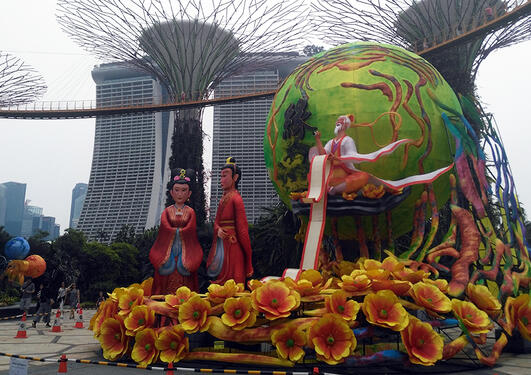Radical science in the Anthropocene: Prospects and perils
This workshop is a cooperation between the Centre for Women's and Gender Research (SKOK) and the research group Egalitarian Futures Research Group (FUTURES) at UiB.

Main content
The workshop is a collaboration between the Centre for Women's and Gender Research (SKOK) and the cross-displinary Egalitarian Futures Research Group (FUTURES) located at the Department of Social Anthropology at the University of Bergen (UiB). At the workshop, affiliated researchers and PhD candidates will present early-stage projects or paper ideas as input to the discussion.
The workshop partners from Florida International University (FIU) are:
- Kevin Grove (participates in person)
- Stephanie Wakefield (participates remotely)
- Genevieve Reid (participates remotely)
- Sarah Molinari (participates remotely)
They are all part of "Interdisciplinary humanities and social science network for research on race, risk and urban resilience."
Please note that the workshop is only open to invited guests.
Abstract
Critical social sciences and the humanities have typically framed the relation between science, state and society in a straightforward manner: science provides totalizing, universalizing truth claims that rewrite socio-ecological reality in abstract terms that facilitate dispossession, capital accumulation, and state rule. The role of critique, in this framing, is to demonstrate the partiality of these truth claims, and show that they reflect geo-historically specific interests and power dynamics. Science and critique become oppositional practices, with critique even taking on the character of an ‘anti-science’, and the veracity of critique often judged by the extent to which analysis questions and contextualizes scientific truth claims.
However, this opposition has become increasingly difficult to sustain with the emergence of the Anthropocene. In this workshop, we seek to problematize the relation between science and critique by exploring, through a variety of cases, how the problematic of the Anthropocene is transforming conditions of both science and critique.
We are particularly, although not exclusively, concerned with the way that the prospects for and perils of radical science are being worked out in the context of growing interest in resilience, posthumanism, new materialism, affects, speculation, indigenous knowledge, ontology (the material entanglements of interactive life), etc. This increased interest, we note, occur in the context of so-called global challenges, such as climate change, biodiversity loss, sustainability, international migration, urban sustainability, and so forth.
Some key questions we hope to consider include:
- What forms of truth circulate through various initiatives aimed at facing so-called global challenges?
- What forms of expertise do the initiatives construct to mobilize these truth claims? How do these contrast or resonate with established forms of expertise?
- What forms of authority circulate through the initiatives? How do these draw on, rework, challenge or shore up existing forms of authority?
- What practices of recognition do the initiatives facilitate? How do these draw on, rework, challenge or shore up existing practices of recognition?
- How might these forms of truth, expertise, authority and recognition resonate (or not) with the reshaping of what both “radical” and “science” might look like today?
Program
MONDAY 13 June
Top floor Social Science building, Fosswinckelsgate 6
14:00 – 14:30: Welcome and introduction
14:30 – 15:15: Maja Hojer Bruun – Urban experiments in a ‘resilient city’
15:15 – 16:00: Vaja Lozic – Learning as resilience strategy (Zoom)
Break
16:15 – 17:00: Kevin Grove - The limits of interdisciplinarity in the Anthropocene: Science, synthesis and epistemic abandonment in the Florida Everglades restoration
17:00 – 17:45: Genevieve Reid (Zoom, EDT 1100 – 1145) – Methodological approach to (re)define and map resilience and co-produce knowledge with community organizations in Miami
Break
18:00 – 18:45: Cecilie V. Ødegaard - Returning to nature at the frontiers: Expertise, state and society in post-carbon transition, Svalbard
19:30: Dinner at restaurant, Kulturhuset, Vaskerelven 8: https://www.kulturhusetibergen.no/
TUESDAY 14 June
Centre for Women’s and Gender Research (SKOK) seminar room, Parkveien 9
14:00 – 14:45: Anders Rubing – Nonlinear paths and gaps to standardized actionable answers in urban resilience learning
14:45 – 15:30: Bjørn Bertelsen – The production of non-future
Break
15:45 – 16:30: Stephanie Wakefield (Zoom, EDT 0945 – 1030) – Reappropriating urban future scenarios: Anthropocene state sight, social infrastructure, and autonomy
16:30 – 17:15: Sarah Molinari (Zoom, EDT 1030 – 1115) – Authenticating loss: Property, homeownership, and the politics of housing repair evaluation in Puerto Rico
Break
17:30 – 18:15: Randi Gressgård – Vulnerability and learning in post-liberal resilience
18:15 – 19:00: Round off and next step
19:30: Dinner at restaurant Bien Centro, Nordahl Brunsgate 9.
Presenters:
Bjørn Bertelsen, UiB
Maja Hojer Bruun, Aarhus University
Randi Gressgård, UiB
